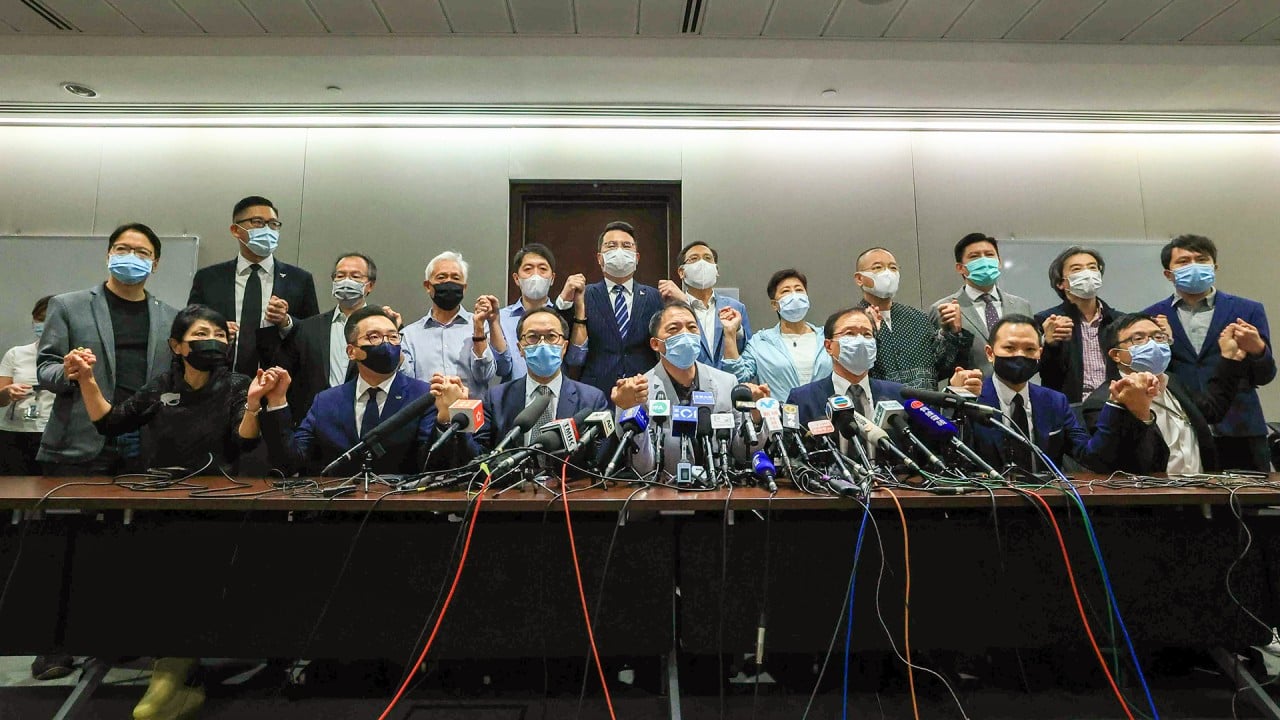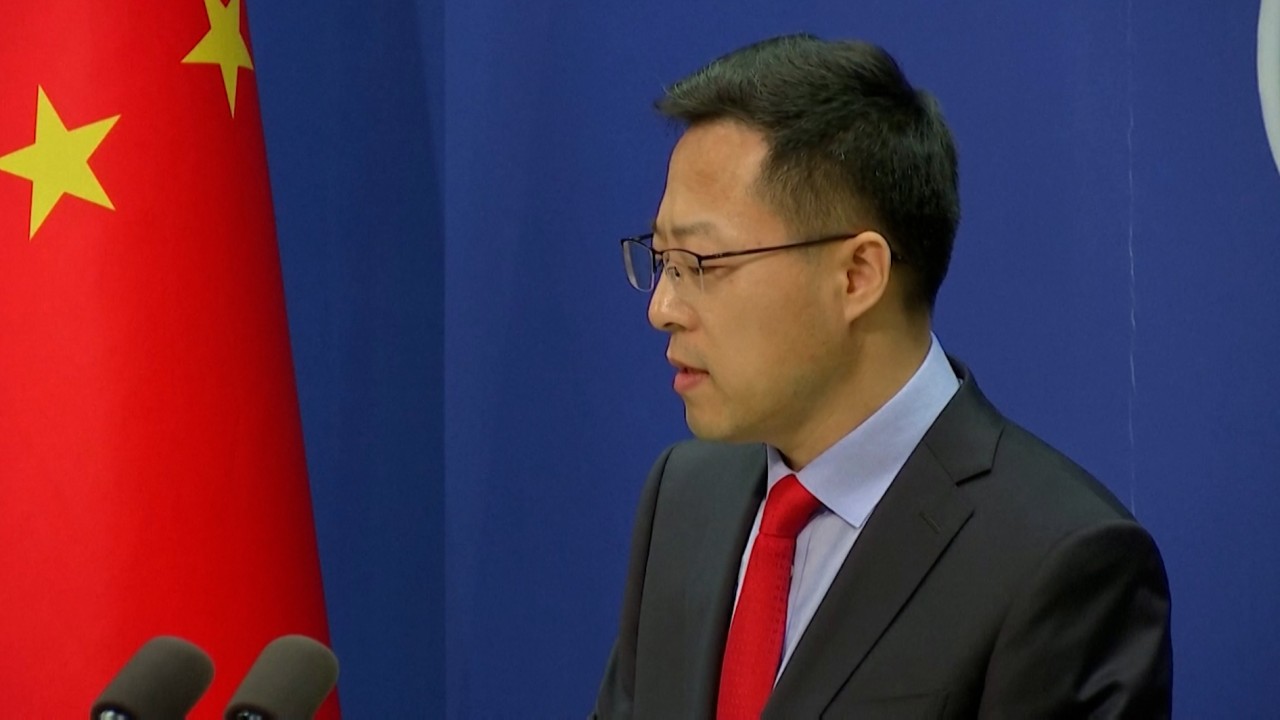
Echo chamber or sound politics: how will Hong Kong’s legislature function without an opposition?
- Some pro-establishment legislators gleeful at opposition bloc’s exodus, but others warn of hard work ahead in proving they are not rubber-stamp politicians
- Beijing ruling earlier this month triggered expulsion of four opposition lawmakers and synchronised resignation of remaining colleagues
Even members of the pro-establishment camp were taken aback.
Others are not concealing their relief that the opposition is gone, saying this will make it much easier for Legco to approve major government projects or controversial legislation without obstruction.
“As none of them would like to present themselves as yes-men to the public, they will try to be more constructive in the remainder of the term,” said Lau Siu-kai, vice-president of the semi-official Chinese Association of Hong Kong and Macau Studies and a senior Hong Kong adviser to Beijing.
“Unlike in the past when these lawmakers would easily support the government, the administration may have to incorporate their interests to win their support on policies.”
Lau said that at this point, it was hard to tell if Beijing would allow these opposition figures to make a comeback even if some wanted to participate in elections again.

Under the resolution passed by China’s top legislative body, the National People’s Congress Standing Committee (NPCSC), Hong Kong lawmakers will lose their seats immediately if they are deemed to have engaged in various acts, from endangering national security to dishonouring their pledge of allegiance and refusing to support China’s sovereignty over the city.
Hong Kong authorities followed up immediately by disqualifying lawmakers Alvin Yeung Ngok-kiu, Dennis Kwok, Kwok Ka-ki and Kenneth Leung.
All four were barred by electoral officials earlier this year from contesting Legco polls originally slated for this past September because they had lobbied foreign governments to impose sanctions on Hong Kong.
On Tuesday, Zhang Xiaoming, deputy director of the State Council’s Hong Kong and Macau Affairs Office, made clear that anti-China activism would no longer be allowed among legislators and officials by law – a key step to ensuring that patriotism underpinned the city’s political system.
With Beijing making patriotism a prerequisite for becoming a lawmaker, the fate of Hong Kong’s opposition remains uncertain and analysts said it was unclear if any of the 19 who exited Legco this month would return.
‘We are not rubber-stamp lawmakers’
Veteran pro-establishment lawmaker Wong Kwok-kin, of the Federation of Trade Unions, hoped that the different parties in the bloc could now collaborate to produce a list of policy initiatives they should push the government to introduce in coming months.
He said: “We thank the opposition camp for leaving, ensuring no difficulties when we have to scrutinise bills like ‘external voting’ and local legislation on Article 104 of Basic Law after the resolution.”
Under Article 104, the city’s leader, principal officials, lawmakers and judges must swear to uphold the Basic Law, and pledge allegiance to Hong Kong when they take office.
Lam has also announced that following the NPCSC’s resolution on November 11, her government would look into ways to amend local laws, and align them with Beijing’s requirements.
She emphasised the need to straighten out local laws and the scope of temporary amendments, including the formulation of specific forms of oath for lawmakers and other public officers, and the consequences and mechanisms of violating the oath.
As far back as 2016, the NPCSC interpreted Article 104 of the Basic Law, Hong Kong’s mini constitution, as requiring lawmakers to be “sincere” in taking their pledges or face disqualification.
The largest pro-Beijing party, the Democratic Alliance for the Betterment and Progress of Hong Kong (DAB), said last Wednesday that it wanted regular meetings with city leader Lam, so that the party could follow up with policy suggestions.
DAB lawmaker Leung Che-cheung agreed with Wong that while pro-establishment parties might disagree on socio-economic policies, they were more likely to agree on political or constitutional matters.
“We will be quite united on political issues,” he said. “We will have questions for the government on many livelihood issues, but we will never become opposition forces.”

04:08
Hong Kong opposition lawmakers to resign en masse over Legislative Council disqualifications
Pro-Beijing lawmaker Priscilla Leung Mei-fun, of the Business and Professionals Alliance for Hong Kong, said she hoped to make good use of the remainder of the Legco term to time push for changes and reforms in the city’s political system.
“I want to do something, as the pro-establishment camp has much more bargaining power now,” she said, without elaborating further.
Some in the camp expect they will have to work harder to prove themselves, now that there is no opposition in Legco.
Liberal Party leader Felix Chung Kwok-pan believes that even their own supporters will have higher expectations now.
“Society tends to think we are all yes-men, but we do not want the public to think this way. We are not rubber-stamps. There are still different parties within the pro-establishment force,” he said.
Chung said pro-establishment parties had in the past disagreed with the government and said no to charges on waste disposal, and a move to ban electronic cigarettes.
He felt it was too early to tell if the exit of the opposition lawmakers would result in future Legco elections favouring pro-Beijing figures.
“Things could change in split seconds, just like no one could imagine what happened in the last week,” he said. “Society seems quiet now, but it does not mean everything is solved. I think people are still digesting all that happened so quickly.”
Pro-establishment lawmaker Michael Tien Puk-sun said legislators like him now had to work hard and try to win over some moderate voters from the pan-democrat bloc. He promised to scrutinise every bill proposed by the government.
“Without the opposition, we get a chance to show the public how sensible we can be. When the public knows they cannot vote for radicals under the new rules, they may choose to vote for someone who can still work for them and represent them,” he said.
“Hardcore supporters of the pan-democrats might not vote for me, but what about the moderate ones? They might. I still believe this is a good chance for us to become better ‘opposition’ figures.”

00:45
Beijing says ‘Five Eyes’ allies risk having ‘eyes poked out’ for meddling in Hong Kong affairs
There are two independents in the chamber, Cheng Chung-tai and Pierre Chan.
Since elected in 2016, Cheng was regarded as a lawmaker who kept a distance ideologically from both the traditional pan-democrats and other localist lawmakers who resorted to more confrontational antics in the chamber. Chan seldom comments on issues other than those related to the medical sector.
The Post has reached out to Cheng and Pierre Chan for comment. Cheng declined to comment on his future role, while Chan did not respond.
Among the opposition legislators who resigned was Fernando Cheung Chiu-hung, the Labour Party’s sole lawmaker. He believes it will be hard for them to participate in Legco elections again.
“Beijing was trying to get rid of all of us. I believe everyone who has a little bit of a radical mindset will be banned,” he said, adding that the threshold for contesting elections and entering Legco will be high.
“I cannot imagine any pan-democrat playing along with this new set of boundaries and rules to please the mainland.”
Chinese University political scientist Dr Ma Ngok expects disagreement and infighting in the pan-democratic camp on whether to participate in future elections.
“Some of them may boycott, and some may not have decided yet. They really need to discuss further,” he said. “And we should not forget that all the rules of the game have changed, and Beijing can simply move the goalposts again.”

